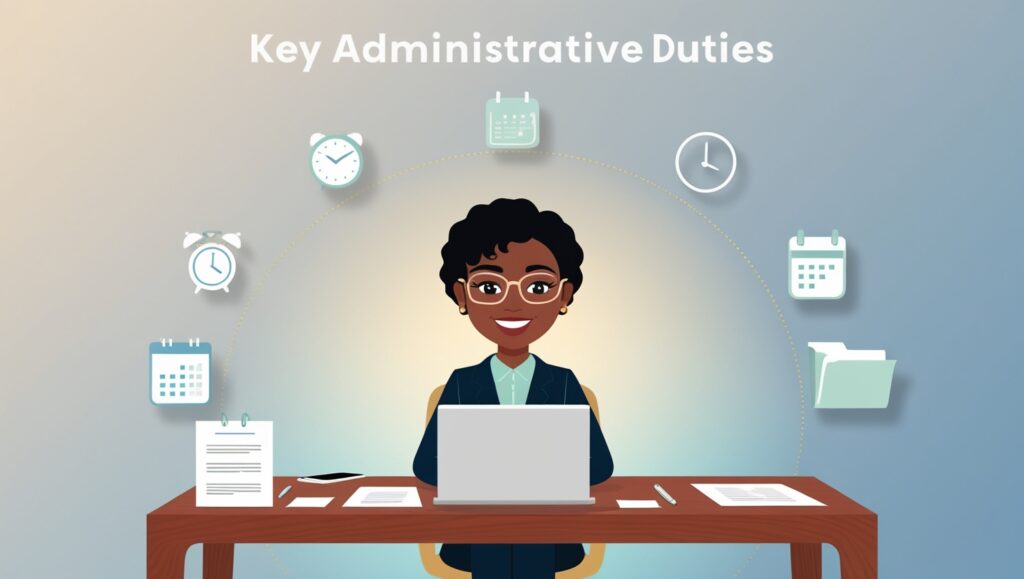The Role of Administrative Assistants is crucial in Enhancing organizational productivity by managing calendars, Coordinating Meetings, and handling essential tasks like data entry and document drafting. Their attention to detail and adaptability allow teams to focus on core goals, ensuring seamless communication and efficient operations. These dedicated professionals are indispensable, providing the foundation for smooth workflows and supporting overall team functionality within the organization.
What is the Role of Administrative Assistants in Organizations?
Administrative assistants, as the first point of contact, ensure efficient communication and task management, enabling others to focus on core duties. Their expertise in communication and time management makes them indispensable in fostering productivity and supporting management systems, making their role vital in today’s workplace.
What are the Key Administrative Duties Performed by Assistants?

| Key Administrative Duties | Description |
|---|---|
| Calendar Management | Organizing and scheduling appointments |
| Office Supplies Management | Tracking and ordering necessary supplies |
| Client Communication | Serving as the primary contact for clients |
| Data Handling | Managing and organizing important information |
Techniques Can Assistants Use for Better Time Management
Administrative professionals often find that their Role Goes Beyond traditional duties. They play a crucial part in fostering a Positive Work environment by managing calendars and coordinating meetings.
| Technique | Description |
|---|---|
| Prioritization | Identifying tasks based on urgency and importance. |
| Time Blocking | Allocating specific time slots for different tasks. |
| Delegation | Assigning tasks to team members to enhance efficiency. |
| Digital Tools | Using apps and software to streamline task management. |
What Skills are Essential for Administrative Professionals?
Administrative professionals are vital in organizations, providing essential support for smooth operations. Their tasks, from managing calendars to coordinating meetings, require strong organizational skills. Additionally, excellent communication and interpersonal skills are crucial for fostering collaboration with colleagues and clients, ensuring a harmonious work environment.
Interpersonal Skills Affect the Role of Administrative Support
skills significantly impact their effectiveness. These skills enhance communication, foster teamwork, and create a positive work environment.
Key roles include:
- Facilitating clear communication between teams
- Building rapport with colleagues and clients
- Resolving conflicts amicably
Ultimately, strong interpersonal skills enable Support Staff to Play a vital role in administrative efficiency and organizational success.
How Do Administrative Support Staff Adapt to Changing Work Dynamics?

- Administrative Support Staff play a crucial role in navigating changing work dynamics.
- They adapt by embracing new technologies.
- They enhance their communication skills.
- They foster collaboration among teams.
- They remain flexible, often taking on diverse responsibilities.
- They meet the evolving needs of the organization, ensuring smooth operations.
Challenges Do Administrative Professionals Face in Modern Offices
Administrative professionals face several challenges in their roles:
- Information Overload: They often deal with a high volume of emails, documents, and data, making task prioritization difficult.
- Technological Adaptation: Rapidly evolving software and tools require ongoing learning and adaptability.
- Work-Life Balance: The demands of the job can blur personal and professional boundaries, leading to potential burnout.
- Communication Challenges: Diverse communication styles and expectations can complicate collaboration and project management within teams.
Frequently Question Answer
| Q: What is the primary role of administrative assistants in organizations? |
| A: The primary role of administrative assistants is to enhance organizational productivity by managing calendars, coordinating meetings, and handling essential tasks like data entry and document drafting. |
| Q: What key techniques can administrative assistants use for better time management? |
| Prioritization: Identifying tasks based on urgency and importance. Time Blocking: Allocating specific time slots for different tasks. Delegation: Assigning tasks to team members to enhance efficiency. Digital Tools: Using apps and software to streamline task management |
| Q: What challenges do administrative professionals face in modern offices? |
| Information Overload: Managing a high volume of emails, documents, and data, making task prioritization difficult. Technological Adaptation: Keeping up with rapidly evolving software and tools requires continuous learning and flexibility. Work-Life Balance: The demands of the job can blur personal and professional boundaries, potentially leading to burnout. Communication Challenges: Navigating diverse communication styles and expectations can complicate collaboration and project management within teams. |











